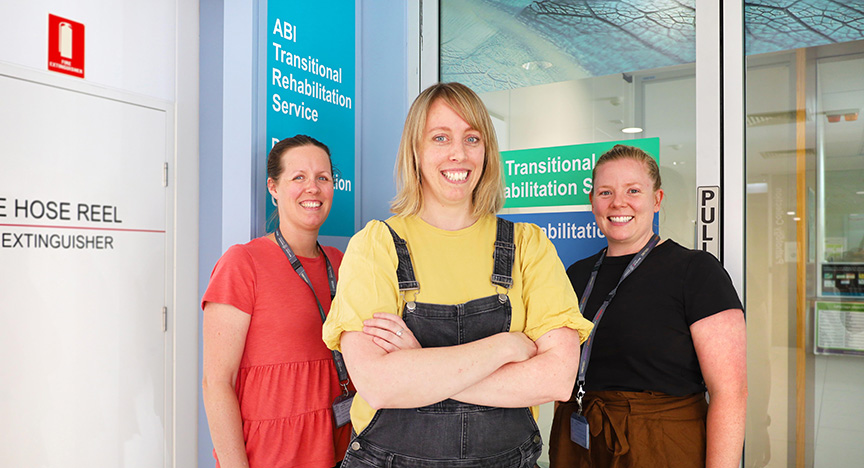
Regional Brain Injury Rehabilitation Unit (BIRU) patients treated at Princess Alexandra Hospital are accessing Brisbane-based accommodation while transitioning out of hospital, thanks to the Acquired Brain Injury Transitional Rehabilitation Service (ABI TRS).
For patients like Neals, a proud Aboriginal and Torres Strait Islander man and Cairns local who spent six weeks in the BIRU, being separated from his family while recovering from brain injury left him longing for home and questioning what was next for him.
“I really wanted to go home. The worst thing about being in this transition was just leaving my kids, my family, and my friends,” he said.
A week out from discharge, Neals was introduced to ABI TRS key worker and Speech Pathologist Nina Wegener, who talked him through the transitional rehab program and made sure he wouldn’t go through it alone.
“Because Neals lives outside of our 50 KM catchment, we were able to offer home-like accommodation for him and his family in Brisbane while he participated in the program,” she said.
The service offers a full gamut of therapies and supports, including everything from speech therapy to neuropsychology and therapy assistant services; but for out-of-catchment patients, access to accommodation often makes the biggest difference.
“The benefits of the accommodation are huge. I don’t think Neals would have received the level of intensity and interdisciplinary input without it, because those specialised resources are not available everywhere,” said Nina.
“This service allows people to be in a home-like environment and not be an inpatient. They can have their family with them and are able to get back into activities of life, while starting to practice strategies and skills in a home-like environment.”
Though he knew the road to recovery would be a long one, Neals says the accommodation offered him a soft place to land while he adjusted to his new normal.
“The house really helped. We were close to a bus station, so that gave us good transportation for my kids to go to the hospital school. It also gave us access to get around and go to the park or the shops. It felt like home,” he said.
“I’m so happy with myself for letting them persuade me to be here. It turned out to be a good transition for us, and it also was even better to have the family with me. Having my family here is the reason I’ve been powering on – my wife has been motivating me. I had Wi-Fi too, so I could use my iPad to keep connected with everyone at home.”
Supporting between 100 - 120 clients each year, Nina says the service thrives on its person-centred service model, specialised interdisciplinary offering and highly skilled clinicians.
“In our service, we see people immediately. We do inreach while they’re in BIRU, and then we transition them back into the community in a ten-week program after they’re discharged. There’s no wait time,” she said. “We see them as they leave the hospital and work with them to transition them back to life. Whether that be return to work, or return to leisure and recreational activities, those goals are guided by the clients.
“We’ve got a lot of resources, and we work in a very interdisciplinary way to ensure clients are getting what they need.”
Queensland’s first transitional rehabilitation service for brain injury, ABI TRS is reducing pressures on every side of the health system, with the availability of local accommodation driving outcomes for people who would otherwise have limited options after leaving hospital. This in turn increases capacity in other parts of the Brain Injury Rehabilitation Service at PAH.
“Our early findings showed that we reduced the length of inpatient stays at BIRU by eight days across the ward. We also freed up capacity of the BIRU day hospital service, so they were able to offer more services to a broader group of patients.
“We know our clients have better gains doing therapy in their own homes and community than coming in and sitting at a desk, and the research says that that home and community-based therapy gets better outcomes.”
With permanent funding secured in mid-2022, the ABI TRS team now look forward to reaching more people, no matter their postcode.
“People come to BIRU from across the state and from Northern NSW. If they can stay for longer, we can put them up in our accommodation with their family and help them through that transition so they don’t miss out.”
After transitioning back to Cairns a week early with the support of ABI TRS, Neals says he is infinitely grateful for his experience.
“It was really tough in the beginning, but I realise now what I have gained from this program is better than a few therapy sessions,” he said.
“I hope my journey will encourage others going through the same experience.”